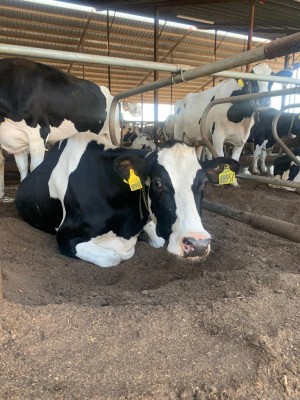Maintaining a Low Somatic Cell Count During the Winter - PSU Extension

Maintaining a Low Somatic Cell Count During the Winter (To access original article, click here)
by Amber Yutzy Assistant Director, Animal Systems Programs - Penn State University
Winter is upon us, and dairy farms in central Pennsylvania are still finishing up harvest while they prepare. Many areas of the dairy need extra attention during the winter months to prevent broken pipes, sick calves, frozen water and, of course, mastitis. Prevention is the key to a low stress winter! Taking a few simple steps now to prevent a mastitis outbreak will save you money and headaches in the future. The foundation of mastitis control during the winter is milking clean, dry udders/teats. Sounds simple, right? Mastitis is often a problem in the winter, because it is more difficult to keep cows clean and the wet environment supports bacteria growth. As always, it is important to maintain an adequate amount of clean bedding in stalls or bedded packs. During the winter months it is often necessary to bed and groom stalls more regularly. Wet bedding can easily grow mastitis-causing pathogens as well as cause cows to become dirty.
It is also important to reduce hair on the udder to control soil, bedding, and manure accumulation on the skin. A high somatic cell count is directly correlated to poor udder cleanliness. Fall is the time to trim or flame udders. Keeping the hair trimmed all year round eliminates one more chore to do this time of the year.
During winter months, producers tend to skip a very important part of mastitis control…post dipping. Post dipping is an essential part of mastitis control. Frostbite is a concern when post dipping cows in the winter. When the wind is howling and temperatures are close to 10 degrees, you may be tempted to skip the post dip. An alternative strategy you could implement in the winter is to put post dip on for a 30-second contact time, then dry teats before sending cows out of the parlor. You will still get the protection of the post dip, but won't run the risk of frost-bitten teats. This practice will add some time to milking, but it only needs to be implemented in extremely cold weather.
Winter can be a tough time on producers and cows. Ease your stress by managing for mastitis year-round. Remember, prevention is the key! Keeping cows out of the wind, providing bedding that is clean and dry, ensuring udders are dry, and maintaining a balanced ration will help your cows get through winter without mastitis, frostbite, and problems from cold stress.
Upcoming Events
WEBINAR - Automated Milking Systems Efficiency: Balancing Focus on Individual Cows and System Optimization
May 8, 2024
Please join Cornell the SWNY team and MSU Extension for our talk with Dr. Pablo Silva Boloña on improving efficiency of Automated milking systems by focusing on milking settings for individual and group success.
Broiler Field Day at Sunny Cove Farm
June 6, 2024
Alfred Station, NY
Join us for a field day to explore broiler production, processing, and finances. Meghan Snyder of Sunny Cove Farm will be our host. She raises small batches of organic broilers, processing them on-farm under the 1,000 bird exemption.
Cornell Seed Growers Field Day
July 2, 2024
Ithaca, NY
Please Save the Date for the Cornell Seed Growers Field Day to be held the morning of July 2nd. The event will be held at the NYSIP Foundation Seed Barn, 791 Dryden Rd., Rt. 366, Ithaca, NY.
Announcements
No announcements at this time.





